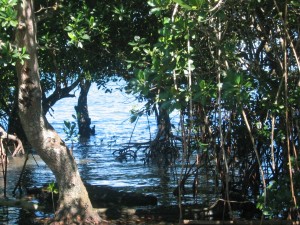Mangroves are one of the world’s most threatened habitats. Shrimp farms account for about 38% of their destruction.

Recently, the mangrove ecosystems in developing countries have become vulnerable to such destruction. To build a shrimp farm, the mangroves must be ripped out and the area bulldozed to make way for the shrimp. When the mangroves disappear, a chain reaction occurs. Local water sources become susceptible to pollution without the mangrove roots acting as filters. Erosion increases without the tree roots holding the topsoil in place. Fish and animals that depended on the mangrove ecosystem to live also disappear. And communities who depended on those creatures, the land, and water as a source of livelihood are harmed.
Most shockingly, because of the artificial feed, antibiotics, and chemicals used, shrimp farms can only last in one area for 3-5 years, before they destroy the region and must move on to more fertile territory.
On Brazil’s Bahia coast, Global Greengrants grantee Movimento Cultural Arte Manha is using art and film to promote social and environmental causes. The region was threatened by a large shrimp farming project which would have negatively impacted the mangrove ecosystems and destroyed traditional communities that depend on mangrove resources to live.
To confront this challenge, Movimento Cultural Arte Manha campaigned to raise awareness in the communities and edited a short film by the Environmental Justice Foundation called, “It is All Lies”, showing the real social and environmental impacts of shrimp farms through the eyes of affected communities. They also networked with other national and international NGOs and strengthened a movement for the creation of a mangrove park.
Their work paid off. The Caravelas region has been protected.
In June 2009, the government signed a law that created the “Reserva Extrativista de Cassurubá,” a marine reserve of 100,687 hectare, thereby stopping the shrimp company from gaining access to the area. Thanks to generous Global Greengrants donors and the work of grantees and local communities, the Caravelas region of Brazil is protected from pollution, the loss of livelihood, and the loss of biodiversity.
If you would like to lessen your impact on artisanal fisheries and marine biodiversity, check out this list from Monterey Bay Aquarium of shrimp to avoid.
